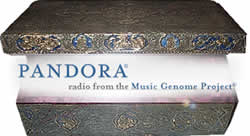 Life has to be good for Pandora, right? They are rapidly becoming one of the most popular web radio/music discovery services. At roughly one million listeners daily, Pandora’s unique web vehicle for creating "radio stations" based on your taste in music is truly a breakthrough idea. If you’ve never visited Pandora, it’s a simple and elegant concept. You type in a favorite song or artist (or more than one), and the Music Genome Project takes over, finding you music that in one way or another is in-sync with your original tastes. You can minimize it in the background or you can dig in and start finding new songs and artists that you may end up loving.
Life has to be good for Pandora, right? They are rapidly becoming one of the most popular web radio/music discovery services. At roughly one million listeners daily, Pandora’s unique web vehicle for creating "radio stations" based on your taste in music is truly a breakthrough idea. If you’ve never visited Pandora, it’s a simple and elegant concept. You type in a favorite song or artist (or more than one), and the Music Genome Project takes over, finding you music that in one way or another is in-sync with your original tastes. You can minimize it in the background or you can dig in and start finding new songs and artists that you may end up loving.
Pandora doesn’t work flawlessly because we’re dealing with something that’s unscientific – your taste in music. But you can reject songs that you don’t like. And more importantly, you often end up discovering music and bands that you’d never heard of before. If you like what you hear, you can instantly buy a song or album from iTunes or Amazon.
Now there’s a nifty icon for Pandora on every new iPhone sold that brings in 40,000 new customers every day. And in our Tech Poll this past February, we saw rapid growth for Pandora among our Rock-based sample, and they are now regularly being mentioned in focus groups and L.A.B. sessions without prompting. So what could possibly be going wrong for Pandora?
Well, according to Pandora’s founder, Tim Westergren, "We’re approaching a pull-the-plug kind of decision. This is like a last stand for webcasting."
That’s because the Copyright Royalty Board decision last year to more than double the fees for songs played on web radio is crippling Pandora. The estimate is that they’ll run up a tab of $17 million this year in fees, which equates to 70% of the total revenue that Pandora generates. Not a great business model.
But as we’ve seen with terrestrial radio, SoundExchange continues to take the short-sighted view. Even though musicians and performers love Pandora because it exposes music you can’t hear anywhere else (not to mention the info provided by Pandora and the easy opportunity to buy music), SoundExchange continues to scream for what they call "fair compensation for the blood and sweat that forms the core product."
Whatever. Radiohead, Nine Inch Nails, and other bands are realizing that there have to be alternative ways to distribute and expose their music. And conversely, Pandora may have to get more creative in its monetization efforts in order to generate more revenue.
As Westergren notes, however, "When we have our board meetings, the central topic is the revenue trajectory, not how happy our users are."
Sound familiar? It’s a testy environment out there, as digital access clashes with revenue realities and the confluence of old and new media businesses. Everyone’s fighting for survival, and it’s often not pretty. SoundExchange certainly isn’t making it any easier with their hard-line stance that threatens to cripple many music-focused vehicles – or put them out of business altogether. They’ve even tried to somehow prove that AM/FM radio has had a negative effect on artists over the years, so you have to wonder who’s coming up with their almost bizarre philosophy about compensation. But whether you’re good old radio or brand spanking new Pandora, reinventing a revenue model for this new millennium continues to be the #1 challenge.
- Why “Dance With Those Who Brung You” Should Be Radio’s Operating Philosophy In 2025 - April 29, 2025
- The Exponential Value of Nurturing Radio Superfans - April 28, 2025
- What To Do If Your Radio Station Goes Through A Midlife Crisis - April 25, 2025




We recently launched an internet radio platform called Highnote. It’s a music discovery engine (highnoteradio.com), but at the core is a business model based on a promotional platform designed specifically for streaming music. Labels and independent artists get promotional exposure for their new music in the most natural way – played directly after artists that are similar. Ex: I am an artist that cites Coldplay and U2 as influences, I can get my track played into streams after users hear songs by Coldplay and U2. As an artist trying to build a fan base, I only pay for qualified traffic to my web site or MySpace page, where I sell music & merchandise directly.
The crucial thing here is that revenue is cost-per-click based rather than cost-per-play, so a) bands/labels pay only for qualified traffic to their web sites, which they monetize directly via music & merchandise sales and b) the listener experience is optimized by setting thresholds for click-through rates.
feedback welcome, we’re at https://www.highnoteradio.com